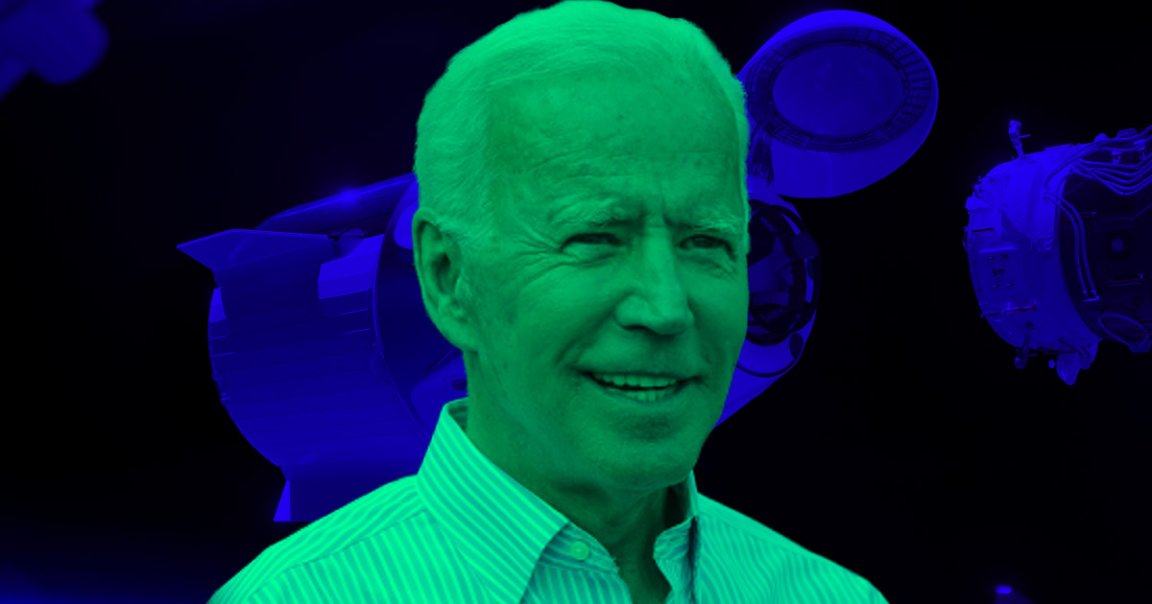
SpaceX’s workhorse Falcon 9, emblazoned proudly with the NASA logo on its side, went vertical at historic Launch Complex 39A in Cape Canaveral, Florida today. On Saturday November 14, the rocket will carry a Crew Dragon spacecraft loaded with a crew of four astronauts to the International Space Station.
If all goes well, it’s bound to be a historic moment. It’s the first operational crew mission launching from American soil since the retirement of the Space Shuttle program in 2011. It’s also the culmination of years of hard work — and a continuous effort to push for funding NASA’s Commercial Crew Program.
And while the Trump administration was quick to take credit for SpaceX’s achievements in space travel, TIME reports, the program had one staunch supporter from its first inception in 2010: former vice president and now president-elect Joe Biden.
“Joe Biden was very much a part of this whole thing,” Bill Nelson, former Democratic senator from Florida who served under Obama and Biden, said during a press conference in May, as quoted by SpaceNews.
Nelson recalled that Biden helped him push an authorization bill through Congress back in 2010 that backed the development of the commercial crew program, as well as the development of NASA’s Space Launch System and Orion.
Nelson spoke on the eve of the launch of Demo-2, the first-ever crewed test flight of SpaceX’s Crew Dragon spacecraft on May 27. “He was very much a part of the decision-making that went into this and ultimately brings us to this success that we hope will launch tomorrow,” he said of Biden.
“I spent a lot of time with him,” former NASA administrator Charles Bolden who served under Obama and Biden, added.
Saturday’s historic launch comes just days after current NASA administrator Jim Bridenstine told Aviation Week that he would be stepping aside after Biden is sworn in as president in January.
The Commercial Crew program was first established in 2011 and was designed to fund private industry alternatives for carrying astronauts to the ISS. The program’s roots date back to the Bush administration, when NASA’s Orion spacecraft was originally seen as the agency’s next ISS shuttle.
Orion was later relegated to deep space missions, including trips to the Moon. In September 2014, NASA chose Boeing and SpaceX to fly astronauts to the ISS — two years before Trump took office.
Since then, development of both spacecraft, SpaceX’s Crew Dragon and Boeing’s Starliner, were plagued with delays, forcing NASA to keep making use of Russia’s Soyuz spacecraft to ferry astronauts to the space station.
Which brings us to now.
Biden has rarely commented on space policy during his campaign. In fact, his platform has made almost no mention of it.
In May, Nelson said that his hope is that a Biden administration “will continue to march the way that we’re headed now, heading back to the Moon and then on to Mars.”
But the ongoing global pandemic likely forced Biden’s hand to focus on emerging and arguably more pressing matters instead, as TIME argues.
Going forward, NASA’s development of its Space Launch System and Orion capsule isn’t likely to stop overnight. The agency has poured billions of dollars into both since their inception in 2004 — and with little progress given the time and funding. The SLS alone has run grossly over budget and behind schedule.
NASA, under Trump, has repeatedly doubled down on returning astronauts to the Moon under its Artemis program — whether inside an Orion capsule or SpaceX’s Starship.
Whether the Biden administration will follow in those footsteps is still uncertain. Four main “priorities” recently listed on Biden’s transition website don’t include a space directive, leading some to believe that NASA may turn its focus towards climate change, not returning humans to the Moon by 2024, under Biden.
On the campaign trail, Biden and vice president-elect Kamala Harris have placed far more emphasis on solving our current global crisis rather than space exploration. Whether that will mean less funding for the Artemis program is still too early to tell.
“If they talk about the Green New Deal, that would rely heavily on NASA to be a part of getting that implemented using technology in orbit,” Bolden told Politico.
The Democratic Party’s platform calls for “strengthening NASA and the National Oceanic and Atmospheric Administration’s Earth observation missions to better understand how climate change is impacting our home planet” — while simultaneously “continuing the spirit of discovery that has animated NASA’s human space exploration.”
Current Democratic congressional members have also voiced their skepticism over whether NASA is even capable of meeting the 2024 deadline, as SpaceNews reported on Monday.
But given Biden’s history advocating for NASA’s Commercial Crew program, the dream of landing the first-ever woman on the Moon — no matter how long it will take — is far from lost.
READ MORE: As a Candidate, Biden Said Little About Space. Here’s What He Might Do as President [TIME]
More on Biden: The Head of NASA Is Quitting After Trump Defeat